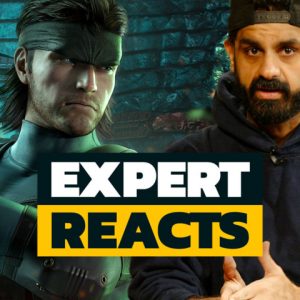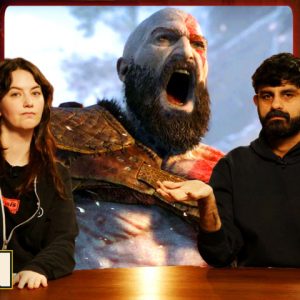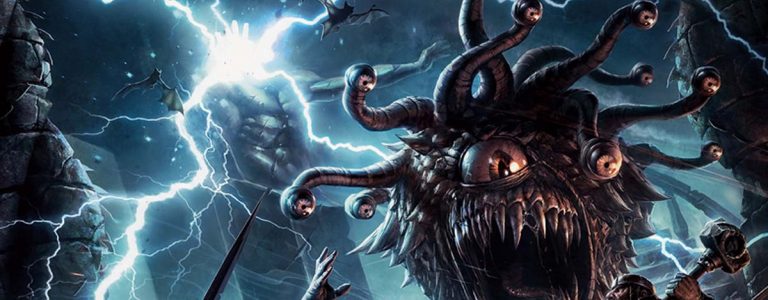This story is part of our new Future of Gaming series, a three-site look at gaming’s most pioneering technologies, players, and makers.
Viktor Vektor’s office is one of the most gruesome places in all of Cyberpunk 2077. A back-alley ripperdoc, he makes a living cutting patients open, swapping out their synthetic implants, and bandaging them back together again. It’s ground zero for where the meat meets the metal in the sci-fi RPG’s commodified depiction of a post-human future, a reminder of the fleshy, fragile humanity behind every new tech fetish. Given all that, it’s eerily ironic than that Viktor Vektor’s Polish voice actor would be the one to have his performance synthetically re-created for this year’s big expansion, Phantom Liberty.
Miłogost “Miłek” Reczek voiced the Polish version of the fan-favorite cyber surgeon throughout the base game released back in 2020. The longtime actor with credits ranging from games to films, including voicing Obi-Wan Kenobi for the Polish dub of the Star Wars prequels, died of cancer at the age of 60 in 2021. But rather than recast his role in Cyberpunk 2077 for the expansion, developer CD Projekt Red turned to a solution that sounds every bit as sci-fi as the game it was for: using voice cloning to effectively bring his voice back from the grave.
“When we learned that his character was slated to return in Phantom Liberty, we had to think about how to approach the situation,” Mikołaj Szwed, localization director at CDPR, said in a statement. “One solution would be to re-record the entire role both in Cyberpunk 2077 and the expansion with a new talent, but we didn’t like this approach, as Miłek was one of the best Polish voice talents and his performance as Viktor was stellar.”
Enter Respeecher, a new company developing this voice cloning technology. With permission from his sons, the startup used existing recordings of Reczek to create an algorithm that could mimic his style. A new performer, Janusz Zadura, was brought in to voice Vektor’s new lines for Phantom Liberty while doing his best impression of Reczek. The two attempts at mimicry were then combined, bringing Viktor Vektor’s new voice in the recent release as close to the original’s as possible. No one seemed the wiser until CD Projekt Red and Respeecher made the collaboration public.
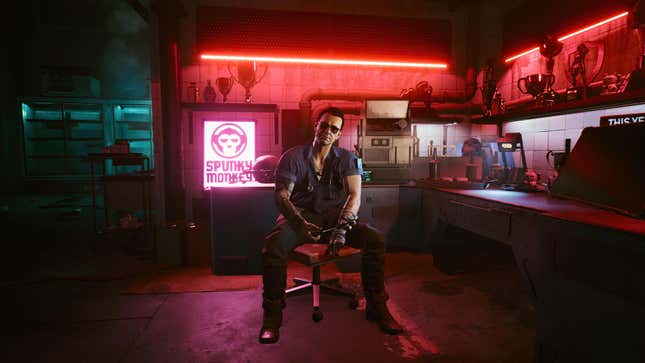
Voice cloning is one of the many services provided by the generative AI startup. Co-founded in Kyiv, Ukraine by Alex Serdiuk, Dmytro Bielievtsov, and Grant Reaber in 2018, Respeecher has raised millions off its promise to create any voice you’re looking for, no matter the age, gender, or language. Its technology has been used to de-age Mark Hammil’s voice for Luke Skywalker in The Mandalorian and to make former football icon Vince Lombardi say things he never said to promote Super Bowl LV. It sounds like something out of a Twilight Zone, but it’s real and could drastically change how games are made.
“I never thought that the technology we use would be changing that much and that rapidly,” Alex Serdiuk, Respeecher’s CEO, told Kotaku in a recent interview. “I would say that like 90 percent of what we are using now is different from what we used a year ago.” The prospect of exponential technological improvement is at the heart of every threat and every promise around generative AI and machine learning, popular monikers that mostly refer to large computer models taking in tons of data to return the types of complex outputs usually only associated with human thought and creativity.
Respeecher’s work runs from pricey projects for big movie studios and game companies to a marketplace of cheaper off-the-shelf tools and voices for smaller companies and creators. At one end of the spectrum are bespoke algorithms geared to a particular person’s performance—James Earl Jones’ Darth Vader or Sunny Suljic’s Atreus in God of War—that can augment performances to assist with production. Suljic began recording for God of War Ragnarök when his voice still sounded young. By the end it had grown significantly deeper. Sony partnered with Respeecher to keep his performance consistent through the whole game.
At the other end of Respeecher’s work is a platform meant to “democratize” voice recording for those who can’t afford to hire a range of performers. Instead they can pay a subscription fee as they would with Adobe. One person can record an entire script with multiple characters and then change their voice into a dozen different ones. “It would be the case when a studio like DreamWorks, for instance, and a small creator who creates an animation in their basement could be at the same competitive level,” Serdiuk said. “That means that creativity becomes a bigger theme, it becomes of a bigger value, and that means that distribution of creativity would be more fair.”
Respeecher promises guardrails for this democratization of creativity, from requiring explicit permission of the original performer (or their kin) before training a model on their voice to mimic it, to moderation and oversight to prevent its own marketplace from becoming a zoo. If internet platforms have taught us anything in the last decade, though, it’s that those assurances are almost always outpaced by the financial imperative to scale up and that new technologies, once unleashed, rarely remain governed by the original terms of service.
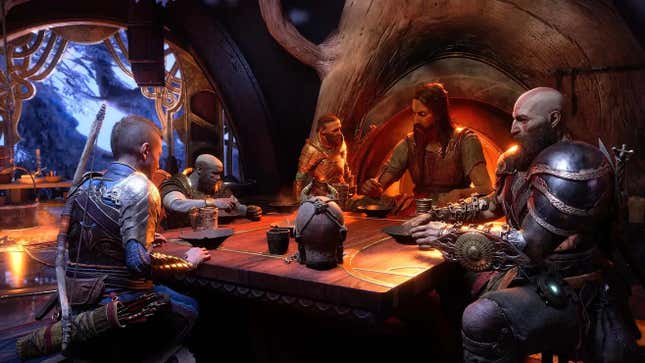
Some video game performers spoke out against un-regulated AI voice-cloning over the summer when a bunch of NSFW Skyrim mods surfaced that incorporate voices based on in-game performances. “I believe the use of AI synthesis for non-consensual voice cloning and NSFW mods/deepfakes should be seen as the violation that it is,” Abbey Veffer, who performed in The Elder Scrolls Online’s recent Necrom expansion, told IGN in July. “In my opinion, this should be treated as similar to revenge porn. It’s a weighted issue rooted in perpetrators playing with power dynamics and wanting a semblance of control at someone else’s expense—namely, actors they may claim to be fans of.”
Issues like these, and collaborations with companies like Respeecher, are part of why voice actors in the United States represented by Screen Actors Guild-American Federation of Television and Radio Artists (SAG-AFTRA) recently voted to authorize a strike if negotiations for a new contract stall. In addition to better pay and stricter safety policies, AI is the big point of contention between performers and gaming companies, with the former demanding that any use of AI to modify someone’s voice in a video game production require a separate written contract.
“We’re not anti-technology, I don’t think anyone is,” Yuri Lowenthal, the voice behind the titular hero in Sony’s new hit PlayStation 5 blockbuster, Spider-Man 2, told Kotaku in a recent interview. The veteran voice actor’s youthful voice has landed him several high-profile roles in the industry, while infamously denying him others like that of the grittier DC comic book hero Batman. “I don’t think anyone believes we could ever stop [AI] even if you wanted it to. But it’s important to figure some things out now so we can all coexist.”
Respeecher’s CEO told Kotaku that regardless of how much AI voice cloning continues to evolve, he thinks humans will remain at the center of it. Like Cyberpunk 2077’s ripperdocs, even the cutting-edge technology still requires a personal touch. “Plenty of companies and plenty of studios themselves are creating those pipelines where no humans are involved but so far we haven’t seen those pipelines work in high quality content,” Serdiuk said. “Humans are still in the loop in our case and it’s gonna be there because humans are best at performing and humans are best in terms of being guided how to perform.”


















